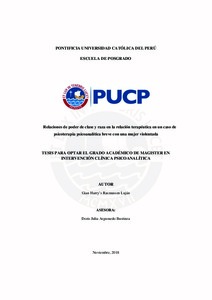| dc.contributor.advisor | Argumedo Bustinza, Doris Julia | |
| dc.contributor.author | Rasmussen Luján, Gian Harry’s | es_ES |
| dc.date.accessioned | 2019-04-30T16:46:47Z | es_ES |
| dc.date.available | 2019-04-30T16:46:47Z | |
| dc.date.available | 2019-04-30T16:46:47Z | es_ES |
| dc.date.created | 2018 | es_ES |
| dc.date.issued | 2019-04-30 | es_ES |
| dc.identifier.uri | http://hdl.handle.net/20.500.12404/14061 | |
| dc.description.abstract | Con el propósito de comprender las relaciones de poder de clase y raza presentes en el
vínculo con el terapeuta, se propone estudiar este fenómeno a partir de la descripción de las
diversas configuraciones relacionales de una mujer violentada en la primera fase de su
proceso de psicoterapia psicoanalítica breve. Para ello, se realizaron análisis temáticos
emergentes de las relaciones de poder con los otros significativos y del vínculo con el
terapeuta, cuyas categorías se organizaron bajo la estructura de las configuraciones
relacionales. De modo general, se observó que estas configuraciones repitieron patrones de
poder abusivo en torno a la construcción de categorías identitarias de clase y raza. En las
relaciones de poder de clase se encontraron dos configuraciones relacionales. La primera se
basó en una representación del self como carenciado y una representación del otro como
poseedor violentador, los cuales estuvieron vinculados por un deseo de dependencia. La
segunda presentó un self fuerte y un otro poseedor garante de oportunidades, unidos por un
deseo de independencia. En las relaciones de poder de raza surgió una configuración
relacional con una representación del self como devaluado frente a un otro idealizado,
generándose un deseo por “mejorar” volviéndose como este otro idealizado. En cuanto al
vínculo terapéutico, surgieron tres configuraciones relacionales que guardaron similitudes
con aquellas observadas en las relaciones de poder. Se concluyó que las relaciones de poder
informaron y fueron parte del vínculo terapéutico. | es_ES |
| dc.description.abstract | In order to understand the class and race power relations present in the therapeutic
relationship, it is proposed to study this phenomenon from the description of the various
relational configurations of a battered woman in the first phase of her brief psychoanalytic
psychotherapy process. To this end, emergent thematic analyzes were made for describing the
power relations between the patient and her significant others as well as her relationship with
the therapist. Resultant categories were organized in the structure of the relational
configurations. It was noted that these configurations, generally, repeated abusive power
relations built around social identity categories of class and race. Two relational
configurations were found in class power relations. The first one was based on a selfrepresentation
as deprived and an other-representation as a violent possessor, both linked by a
desire for dependence. The second was based around a self-representation as strong and an
other-representation as a possessor that guaranteed opportunities, both linked by a desire of
independence. In the race power relations, it was found one relational configuration that was
based around a self-representation as devalued versus an other-representation as idealized.
Both were linked by the desire to “improve” by becoming like the idealized other. Regarding
the therapeutic relationship, three relational configurations emerged that kept similarities with
those observed in power relations. It was concluded that power relations informed and were
part of the therapeutic relationship. | es_ES |
| dc.description.uri | Tesis | es_ES |
| dc.language.iso | spa | es_ES |
| dc.publisher | Pontificia Universidad Católica del Perú | es_ES |
| dc.rights | info:eu-repo/semantics/closedAccess | es_ES |
| dc.subject | Relaciones interpersonales | es_ES |
| dc.subject | Psicoterapia | es_ES |
| dc.subject | Terapeutas y pacientes--Estudio de casos | es_ES |
| dc.title | Relaciones de poder de clase y raza en la relación terapéutica en un caso de psicoterapia psicoanalítica breve con una mujer violentada | es_ES |
| dc.type | info:eu-repo/semantics/masterThesis | es_ES |
| thesis.degree.name | Maestro en Intervención Clínica Psicoanalítica | es_ES |
| thesis.degree.level | Maestría | es_ES |
| thesis.degree.grantor | Pontificia Universidad Católica del Perú. Escuela de Posgrado | es_ES |
| thesis.degree.discipline | Intervención Clínica Psicoanalítica | es_ES |
| renati.discipline | 313127 | es_ES |
| renati.level | https://purl.org/pe-repo/renati/level#maestro | es_ES |
| renati.type | http://purl.org/pe-repo/renati/type#tesis | es_ES |
| dc.publisher.country | PE | es_ES |
| dc.subject.ocde | https://purl.org/pe-repo/ocde/ford#5.01.00 | es_ES |





